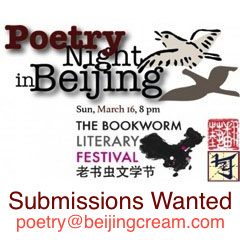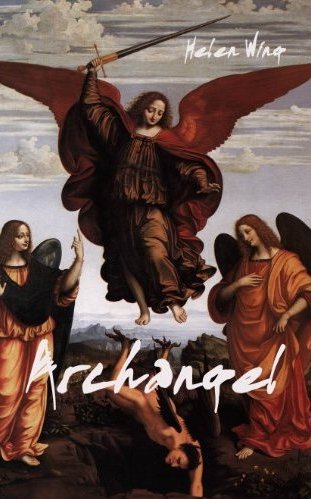
The event is live! Tickets for Poetry Night in Beijing on March 16 at the Bookworm Literary Festival are officially being sold at the Bookworm. Please let this be a reminder that we are still seeking submissions for those interested in participating in the event, i.e. reading in front of an audience. Along with Pathlight, our lovely event partners, we are accepting poems until March 1. Please see here for guidelines.
Submissions will be anonymized and sent to our three readers, Canaan Morse, Eleanor Goodman, and Helen Wing.
We recently caught up with Helen to ask about poetry, including her own. She is the author of the collection Archangel, currently available at the Bookworm and on Kindle via Amazon. The following interview was done via email.
There’s a certain way of looking at poetry that I particularly like. Some people ask poets, “When did you want to be a poet?” But the question should really be posed to everyone else: “When did you stop wanting to be a poet?” Because growing up, aren’t all of our experiences, particularly the new ones, the intense, best experiences, “poetic”? It’s a shame that, as children, we probably lacked the ear, or training, to express our feelings. So let me ask you: when did you not stop wanting to become a poet?
HW: This is simple for me. The short answer is that I was always too scared to be a poet. I had been accused of being too poetic throughout my life as an academic and also later as a prose writer. I had images that were “too tight” imputed to me and was constantly being exhorted to unravel and extrapolate whilst I always felt that the things I wanted to say would be dissipated and become less resonant if I conceded in my style. Then of course there is the money thing… it was obvious to me that one could not make a living as a poet. But then gradually that changed as I got older. I realized also that one cannot make a living as a mother or a lover or a volunteer but that did not stop me from being those things. In the end poetry was an unstoppable urge in me that broke down my fears and prejudices. Now I realize I am only fully alive as a poet. I know that sounds extreme but truly this has been my experience.
What’s your experience in poetry been like?
HW: I finally gave in to poetry when I was living in Dubai. I heard about an underground poetry group and joined it expecting little in what I considered to be a cultural as well as physical desert. What I found was a group of people performing in English and Arabic who hailed from all over the globe and who spoke eloquently and passionately about the heart and politics and who grasped at beauty in language in full vulnerability and trust. It was amazing. I submitted my poems and read them and after the second time I was told I need not submit but could just read each time. At a time of deep personal alienation this group saved me.
What compelled you to write Archangel? How did that process start?
HW: Archangel is unusual for me. The daemon came upon me unbidden and blindingly. For three months poetry came pouring out of me. It forced me to get up in the night and stop cooking or doing what I was supposed to be doing. I wrote in a trance at these times and then edited the poems that came to me. I absolutely believe that I was a vessel for these poems. I wrote them, yes, with a history in the study of angels for my academic poetics and with a great passion for LOVE but I also feel that I was writing about things of which I, even at my age, have little experience. I feel that because I had been holding back on poetry for so long that these poems were bursting out of me, that they were, if you like, a type of bloodletting. Perhaps you will see in my forthcoming Savage Torpor (poems which pre-date Archangel) the extent to which that outpouring was needed!
How would you describe poetry in Beijing? Or China?
HW: Personally, Beijing lends itself to poetry because as a foreigner I am surrounded by the strangeness and commonality of existence in a very intense way. One of the aims of a poet I feel is to be able communicate small and large truths in an arresting and fresh way, to evoke that strangeness and recognition simultaneously and to capture it for the reader.
Chinese poets are incredibly humble, and China is a place which respects poetry and the poet’s task as real work. People say that there is a great divide between the East and the West in poetic stance. I am fascinated by the idea that somehow the different sensibilities might move in opposite directions into and out of the poetic identity if you like. However I have been amazed, truly amazed to discover that the poetic cannon and life-reading history of the Chinese poets I have read are so very similar to my own reading history, except of course for an in0depth knowledge of Chinese poetry itself. I am dependent on translation. Other than this I would say that Chinese poets are very literary and that they still distance themselves from performance poetry… but then in the West we do the same, we separate out spoken word poetry from “writerly” work. I was very gratified to see Kate Tempest win the Ted Hughes prize this year. A young woman and a performance poet who rightly aligns herself with the bard with her name.
Who are your favorite poets?
HW: Tsvetayeva, Ezra Pound, Celan, Christopher Reid, W.B Yeats, Margaret Atwood, William Carlos Williams, Ahkmatova, Cernuda, Aleixandre, Lorca, Cesar Vallejo… at the moment… but that changes!
What do you read for when you’re reading a poem?
HW: I look to be taken somewhere else through language. I am a firm believer in the “right word” in the “right place,” a rendering of the heart that can only be made in the way it is being made. I am very instinctual about this but I find that when I feel moved by a poem, if I then subject it to higher literary analysis, it always survives that more critical gaze. In sum I look for the plangent image and I listen to the distinctiveness of voice.
What’s one bit of advice you can impart on any poet or writer?
HW: Truth. Your writing will only move another if you speak with utter and trenchant truth.
Edit. Refine, refine, refine your words and stay in the rhythm… no fakery will stay if you listen to the rhythm of your words so read out loud to yourself. Often if you abide by the sounds you will find yourself saying new, unexpected things, some of which will be searingly beautiful!
 Helen has very graciously allowed us to republish the following two poems from Archangel:
Helen has very graciously allowed us to republish the following two poems from Archangel:
All art is absence
Because all art is absence
I want to watch you
touch yourself,
I want to see your curling
as you come.
This gift
I hope you save for me.
Only then will I feel
I have witnessed you
as you have witnessed me
in the exquisite abjection
of my poem.
Which of these two
most human activities
constitutes
the most lonely,
fruitless
intimacy?
Perhaps they are the same?
When you read my poem
you already watch me
touch myself
as I breach the walls
of my most
shameful
incomplete.
All art is absence.
This gift, then,
in recompense,
the curling of your toes,
I hope, Archangel,
you save for me.
~
Truth
It’s true
I barely know you
and yet
it’s also true
I know you as the lightning bolt
is known
by the stricken tree.
Helen Wing is currently Artist-in-Residence at the Harrow International School Beijing.
















































